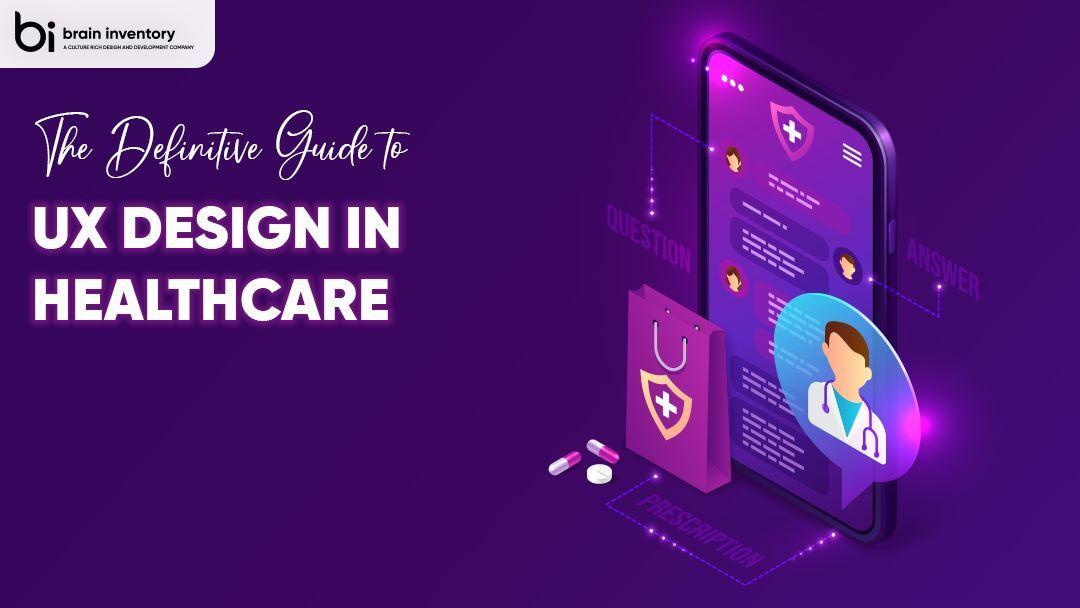The Definitive Guide to UX Design in Healthcare

Quick Summary: Digital healthcare solutions like electronic health records, prescription management apps, symptom trackers, and appointment schedulers are all made more accessible with good user experience design. Digital healthcare organizations must constantly improve the user experience, as it is one of the core principles of digital transformation.
What is healthcare UX design?
Healthcare UX design refers to the application of user experience principles in developing digital interfaces and interactions within healthcare systems. It involves creating intuitive, efficient, and user-friendly designs for websites, mobile apps, and other digital platforms used in the healthcare industry. The goal of healthcare UX design is to enhance the overall user experience for both healthcare professionals and patients.
In healthcare, effective UX design is crucial for facilitating seamless navigation through electronic health records (EHR) systems, patient portals, telehealth platforms, and other digital tools. It considers the unique needs and challenges of users within the healthcare context, aiming to improve accessibility, usability, and overall satisfaction with digital healthcare services.
How is UI/UX Design Used in the Healthcare Industry?
Create a personalized patient experience :
User research is a cornerstone of every user-centered design project. It enables UX designers to understand their users and create products that meet user needs. When conducted right after customer analysis, user research will provide marketers with crystal clear insights about their customer’s preferences.
Increase accessibility of healthcare services :
An intuitive interface enables users to find their way through a digital product or service quickly and easily, without having to search for clues. For example, an intuitive digital health service should provide clear, well-designed information about things like – what the service is about, how patients with different needs can benefit from it, and what they should do next.
Educate patients on a product:
User experience, or UX design, has become an important consideration for healthcare technology companies and medical software developers. User guidance that is clear and easy to understand can help users navigate the product and provide feedback to the developer.
The Future of Healthcare UX Design: 4 Trends
VR and AI:
Artificial intelligence (AI) and virtual reality (VR) are important technologies that will change the future of digital healthcare. The world of medicine is rapidly changing, and the new digital healthcare platforms represent a major transformation. Google has already started using AI in a project called “DeepMind”, which is focused on fighting serious diseases like cancer. In addition, Facebook and Twitter have announced that they are working on the development of similar AI projects. Each interested company offers its own vision of how to use this technology in medicine and healthcare services for patients.
Digital solutions for mental health:
The mental health industry is a multi-billion dollar market with high growth. Despite a global trend of digitizing, the mental health market is still in need of digital technologies to improve its efficacy and make it more accessible. In the same way that physical activity used to be something you do at the gym, there is now a device and app for tracking your movement (fitness trackers), there are also apps that track your sleep and exercise, there are also many apps that help you relax or manage and control your anxiety.
DTx :
DTx stands for Digital Therapeutics, clinical products that often originate from hospital settings or research labs. Digital therapeutics usually refer to some kind of non-digital treatment, with a digital transformation layered on top of it: one example is the digital representation of a therapy that becomes digitally performed instead of directly physically performed. A second example is when a high-end solution is used to treat a patient remotely via telemedicine: this data will be digitally transmitted to a healthcare professional, where he/she can then assess the situation and adapt the therapy accordingly.
Patient-centric care:
Focusing on patient-centric care is now a crucial component of strategies for medical startups. Today’s patients are in constant search of information and online reviews—regardless of the medical procedure they are interested in. They care more about the quality of care, the effectiveness of its services, and a positive experience throughout their journey.
Conclusion
User-centered design is crucial in producing healthcare applications. Unlike eCommerce and enterprise apps which may be far more task-focused, medical applications demand that user experience is always the priority. Any solution conceived and developed without any regard for these factors will fail to generate customer loyalty, let alone success.
Brain Inventory is an internationally operating team of web and mobile app developers and designers. Our main goal is to aid entrepreneurs in validating their business hypotheses. We develop approximately 12 MVPs per month. Our processes are focused on user experience and analytics and can be implemented into projects at all stages of development.

Have an idea?
Get in touch, we’d be
happy to hear from you
We are always looking out for new collaborations, whether you are a client who is passionate about a project or a talent who is interested in joining our team, our doors are always open.
locate us

India (HQ)
618, Shekhar Central, Palasia Square, A.B Road, Indore, Madhya Pradesh, 452001
+918109561401

United Kingdom
Brain Inventory, SBVS, 8 Roundhay Road, Leeds, UK, LS7 1AB
+18008209286

Canada
44 Main Street East Milton, ONCanada L9T 1N3
+4166696505

Jordan
185 Wasfi Al-Tal Street, Ammon Oasis Complex P.O Box 4724 Amman 11953 Jordan
+960770781000

USA
720 Seneca St Ste 107 Seattle, USA 98101
+1(206)6533419
if it's digital,we'll make it.
- Numetric - Online Accounting Software similar to QuickBooks
- Bloomia - Kegel exercise
- Virifi - Blockchain Powered Document Certification & Signing Platform
- Revolution Travel CRM - Custom CRM Built for Travel Agents
- Fatoura - Online Invoicing Platform
- My Fit Mantra - Your health partner
- Ocureel - Relation Building and video sharing Application